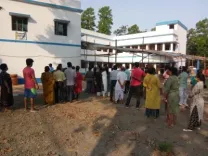Has the Punjab Government Started the Third Phase of Deporting Afghan Nationals?

Synopsis
Key Takeaways
- The Punjab government has commenced the third phase of deporting Afghan nationals.
- Over 42,913 individuals have been deported since April 1.
- UNHCR calls for humane treatment and voluntary repatriation.
- There are 46 holding centres in Punjab for detained individuals.
- Concerns are raised about Afghan women's rights post-deportation.
Islamabad, Oct 12 (NationPress) The government of Punjab province has initiated the third phase of deporting illegal Afghan nationals from Pakistan. This follows the identification of approximately 123 more individuals, who have been moved to holding centres for their impending deportation, as reported by local media on Sunday.
Since April 1, the Punjab government has successfully deported around 42,913 Afghan nationals as part of its Illegal Foreigner Repatriation Plan (IFRP), according to the daily Dawn.
The provincial authorities are actively seeking Afghan nationals without legal documentation or those who have overstayed by more than a year. Currently, there are 46 operational holding centres across the province, including five in Lahore, where those illegally residing are detained until they are sent to the Torkham Border for deportation back to Afghanistan.
Punjab IGP Usman Anwar stated that police are on high alert to ensure the apprehension of Afghan nationals living unlawfully in accordance with international laws. So far, Punjab Police have deported approximately 21,805 illegally residing Afghan nationals and other non-nationals.
In September, the federal government of Pakistan denotified the last Afghan Refugee Camp in Mianwali, along with four similar camps in Khyber Pakhtunkhwa and ten in Balochistan.
Earlier this week, the United Nations Refugee Agency (UNHCR) expressed its concern regarding Pakistan's decision to expel Afghan refugees from 16 villages located in Balochistan, Punjab, and Khyber Pakhtunkhwa. The agency warned that such forced expulsion could result in severe humanitarian consequences, as reported by Afghan media.
Philippa Candler, the UNHCR representative in Pakistan, highlighted that Afghan refugees have resided in Pakistan for many years, establishing their lives, families, and communities. She urged the Pakistani government to halt deportations and ensure that the repatriation of refugees occurs voluntarily and with dignity, as reported by Afghan news agency Khaama Press.
Candler remarked, "These expulsions could inflict tremendous suffering on vulnerable families and hinder efforts for their safe reintegration into Afghanistan." She advocated for a phased approach to the repatriation process, emphasizing the necessity of respecting human rights and humanitarian principles.
The UNHCR's statement came after the Pakistani government ordered Afghan nationals residing in 16 villages to exit the country immediately, as part of a deportation strategy that began in 2023. Pakistani authorities claim this campaign was launched to address security concerns, although rights groups describe it as a form of collective punishment.
The UN refugee agency also expressed alarm over the forced return of Afghan women and girls, who would face significant limitations on education, employment, and freedom of movement under Taliban governance in Afghanistan. The UNHCR urged Pakistan to permit Afghans requiring medical care, higher education, or those in mixed marriages to remain in the country.









